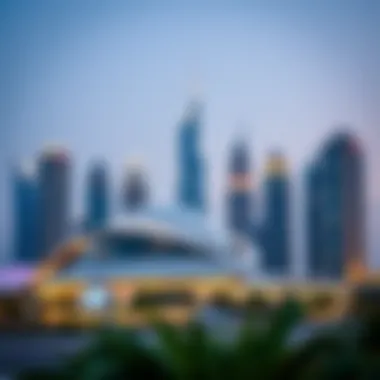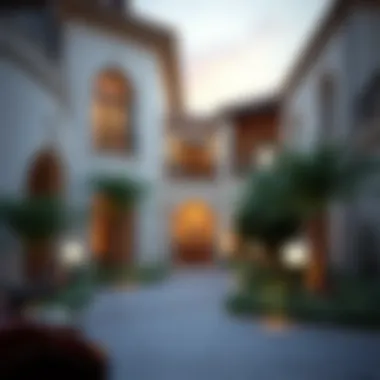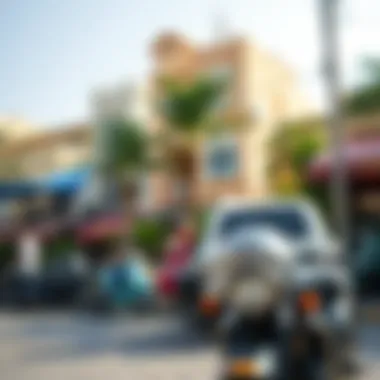Insights into Dubai's Real Estate Market Trends


Intro
The real estate market in Dubai stands as a vibrant reflection of the city's ambitious growth and cosmopolitan essence. With its glittering skyline and burgeoning economy, this metropolis has captured the attention of local and international investors alike. As we delve into the facets of property ownership within this dynamic setting, it becomes crucial to grasp the intricate components that drive the market.
Understanding the current landscape is not merely an academic exercise; it is a vital step for prospective homeowners, seasoned investors, and rental seekers. The nuances of various neighborhoods, types of properties, and evolving market trends need to be explored thoroughly. This piece aims to arm readers with the insights they need not only to navigate but also to thrive in Dubai's unique real estate environment.
Market Trends and Analysis
Current Market Conditions
Dubai's real estate market has historically been characterized by its rapid fluctuations, driven by economic variables and geopolitical factors. As of late 2023, the trend continues, with certain areas witnessing a rebirth while others stabilize after previous highs and lows. Key neighborhoods like Downtown Dubai and Dubai Marina show resilient demand, attracting both lifestyle buyers and investment-focused purchasers.
However, emerging areas such as Dubai South and the residential offerings around Expo 2020 locales provide fresh opportunities.
- International Investors: There’s a marked interest from global buyers, primarily due to favorable legislation and enticing visa policies.
- Rental Yields: Generally, properties in Dubai offer attractive rental yields, often sitting around six to eight percent, a rarity in many mature markets.
- Foreign Ownership: With the introduction of new laws, non-residents have greater access to purchasing property, making Dubai more attractive than ever.
Future Predictions and Growth Areas
Looking ahead, several factors signal potential growth in certain segments of Dubai's real estate market. The anticipated population growth, driven by the influx of expatriates and continuous investment in infrastructure, alongside upcoming events such as the World Expo, may propel prices further upward. Observing the patterns in these dynamically evolving locales can provide invaluable insights into future buying decisions.
- Sustainability Trends: Properties focusing on sustainability and smart technology are likely to become more dominant as buyers prioritize energy efficiency and smart living.
- Community Developments: There’s a shift towards community-centric developments that offer convenience and lifestyle amenities, ensuring safety and comfort for families.
"In the fast-paced realm of Dubai real estate, staying ahead of trends can mean the difference between a savvy investment and a costly regret."
Property Investment Strategies
Types of Properties to Consider
When assessing the myriad of available options, distinguishing between property types is paramount. Each category presents its advantages and challenges.
- Luxury Apartments: Often located in strategic hotspots, these properties appeal to high-net-worth individuals and investors seeking luxury living.
- Villas and Townhouses: Ideal for families, especially in gated communities, these offer ample space and often more amenities, such as parks and recreational facilities.
- Commercial Properties: Investing in office spaces or retail can yield substantial returns, contingent on location and current market demands.
Financing Options and Considerations
Navigating the financing landscape can be daunting for both locals and expatriates. The options range from conventional mortgages to innovative funding solutions.
- Local Banks: Most banks provide mortgages to non-residents, but specific conditions must be met regarding down payments and loan limits.
- Developer Financing: Some developers offer in-house financing plans, which can be advantageous, especially for new projects.
Ultimately, understanding the nuances of financing, taxes, and legal aspects of property ownership is critical. For those who want to dig deeper, resources like Dubai Land Department and Invest in Dubai can offer comprehensive insights.
Investing wisely in the Dubai real estate market requires due diligence, research, and a clear understanding of personal or business objectives. Keeping abreast of market trends and making informed choices can pave the way for successful property ventures in this exhilarating city.
Prolusion to Dubai's Real Estate Market
The real estate market in Dubai stands as a beacon of opportunity and innovation, drawing a diverse range of stakeholders, from local buyers to global investors. With skyscrapers that pierce the clouds and luxurious communities, the landscape is remarkably vibrant. Understanding the ins and outs of this market is crucial for anyone looking to navigate its complexities, whether for personal housing or investment purposes.
Historical Perspective
Dubai's transformation from a modest fishing village to a global metropolis has roots dating back to the 20th century. Before the discovery of oil in the 1960s, its economy was primarily based on trade, pearls, and fishing. The oil boom catalyzed development, leading to infrastructural projects that reshaped the city. In the early 2000s, initiatives like the freehold property law allowed non-UAE nationals to buy real estate, thus attracting an influx of investment. This move heralded a new era:
- Rapid Expansion: The skyline saw an explosion of high-rise buildings and residential complexes.
- Cultural Melting Pot: The influx of expatriates from diverse backgrounds enriched Dubai's cultural tapestry.
- Regulatory Framework: Various laws were introduced to foster a conducive environment for real estate development.
Dubai's progression offers a fascinating case study that highlights how an economic pivot can revitalize an entire city.
Current Market Overview
Shifting gears to present times, the Dubai real estate market remains resilient, even amidst global economic fluctuations. As of 2023, there are several noteworthy trends that underscore the dynamics at play:
- Increased Demand for Residential Units: As Dubai continues to attract more expatriates and investors, the demand for various residential types is on the rise.
- Luxury Segment Surging: High-end properties are seeing price hikes, particularly in sought-after locations such as Downtown Dubai and Palm Jumeirah.
- Shift in Buying Preferences: Buyers are leaning toward sustainable and tech-integrated homes -- a reflection of broader global trends prioritizing eco-friendliness and innovation.
Investors are keenly eyeing emerging neighborhoods that promise growth, making it essential to remain updated on market shifts. The landscape is not just about luxury; it’s also about the evolving preferences and requirements of modern families and professionals.
The Dubai real estate market serves as both a mirror and a canvas, reflecting the aspirations of a rapidly growing cosmopolitan society.
Key Trends Shaping the Market
The real estate market in Dubai is not just a place to buy property; it's a living, breathing entity that reflects global shifts and local aspirations. In this fast-paced landscape, understanding the key trends shaping the market is essential for anyone looking to navigate their way through buying, selling, or investing in real estate. Focusing on technological advancements and sustainability initiatives reveals how Dubai is not only evolving but also setting benchmarks for others to follow.
Technological Advancements
Dubai's real estate sector is becoming increasingly intertwined with technology, transforming how transactions are conducted and properties are managed. From virtual reality property tours to blockchain applications in securing transactions, the advancements are unparalleled. The Dubai Land Department is even exploring blockchain for a transparent and efficient property registration process.
This integration of tech offers multiple benefits:
- Enhanced Transparency: Through blockchain, all transactions are recorded, ensuring that historical data about properties is tamper-proof.
- Cost Efficiency: With technology, operational costs associated with traditional forms of buying and selling are lowered.
- Access to Wider Markets: Remote viewing options cater to global buyers, facilitating overseas investments with ease.
Additionally, artificial intelligence tools are making waves by providing predictive analytics, allowing developers and investors to gauge future market trends with accuracy. With automation in property management, landlords are freed from mundane tasks, giving them more time to focus on strategic decision-making.
"The shift toward a tech-driven real estate industry is not just a fad, it's a necessity for growth and sustainability."


Sustainability Initiatives
As the world grapples with climate change and environmental degradation, Dubai is stepping up its game in sustainability. The local government has put forward various initiatives aimed at reducing the ecological footprint associated with construction and property use. Developers are no longer just focusing on aesthetics; they’re increasingly prioritizing eco-friendly practices.
Some key sustainability efforts include:
- Energy-efficient Buildings: The government encourages designs that utilize renewable energy sources such as solar panels.
- Waste Management Innovations: Advanced recycling processes and waste segregation systems are becoming standard in new developments.
- Green Certifications: Properties that meet specific sustainability criteria are awarded green building certifications, increasing their marketability.
This focus on sustainability doesn’t just appeal to environmentally-conscious buyers but also adds long-term value to properties. With regulations becoming stricter globally, investing in sustainable buildings positions one to meet future compliance requirements while contributing positively to global efforts.
Technological advancements paired with sustainability initiatives are not just trends; they’re lifelines for the Dubai real estate market, providing a robust framework that supports growth and development in line with a changing world. Investors, agents, and prospective homeowners must keep an eye on these trends to make informed decisions that align with both current demands and future expectations.
Investment Insights
When one contemplates the dynamic real estate market in Dubai, it becomes evident that understanding investment insights is crucial. It's not just about buying a property; it's about strategizing to ensure a fruitful investment over time. The allure of Dubai's skyline and luxurious living may dazzle potential buyers, but a discerning investor must focus on underlying factors that influence property values and returns. Here we will explore how to identify profitable areas and comprehend market risks, enabling all investors to make informed decisions.
Identifying Profitable Areas
Dubai’s real estate landscape is continually evolving, and recognizing profitable areas can set apart successful investors from the rest. Certain neighborhoods have emerged as hotspots, characterized by high demand and strong rental returns. For instance, Downtown Dubai is not only home to the iconic Burj Khalifa but also offers a vibrant lifestyle, making it appealing to both expatriates and locals.
However, investments should not be limited to renowned areas. Emerging neighborhoods like Dubai South and Jumeirah Village Circle have been gaining traction as affordable alternatives, providing potential for appreciation and high occupancy rates. Here are some considerations when identifying lucrative locations:
- Market Trends: Keep a close watch on market reports and property listings. Analyzing sales trends can offer insight into which areas are ascending in value.
- Infrastructure Developments: Areas undergoing infrastructure upgrades, such as new roads and public transport facilities, often experience property value increases.
- Policy Changes: Be aware of regulations affecting property ownership and residency. The UAE’s recent initiatives to grant long-term visas to foreign investors can boost demand in certain locales.
Additionally, networking with local real estate agents and attending property expos can enhance your knowledge about up-and-coming areas. Tapping into community opinions and real estate discussions can also provide invaluable local insights.
Understanding Market Risks
While the prospect of investing in Dubai real estate appears enticing, it is vital to recognize inherent market risks. Like any investment, there’s potential for downturns and challenges. Real estate investors must familiarize themselves with these risks to navigate the market effectively.
First and foremost, economic fluctuations can impact the real estate sector. Global economic trends, such as oil prices or international investor sentiment, can sway property demand.
Some critical risks include:
- Market Saturation: With a surge in construction and property releases, some areas may face oversupply, leading to diminished rental yields or property values.
- Regulatory Changes: Sudden changes in real estate laws or policies can affect ownership rights, taxes, and additional charges, influencing investment viability.
- Tenant Default Risks: For investors venturing into rental properties, understanding tenant rights and the associated risks of non-payment or vacancy durations is fundamental.
Investing in real estate requires a careful, studied approach. A thorough risk assessment will mitigate financial setbacks and help you maintain a resilient portfolio.
"Understanding the art of investing goes beyond mere luck. It involves knowledge, vigilance, and the ability to adapt to changing circumstances."
Diverse Property Types
In the bustling sector of Dubai's real estate market, the variety of property types showcases the city's charm and appeal. Understanding the nuances of these different property types is crucial for stakeholders—whether you are a buyer, investor, or real estate agent. Each type brings unique benefits, considerations, and investment potential, making it essential to navigate this diverse landscape with a well-informed strategy.
Luxury Villas
When discussing luxury villas, one must appreciate the lavish lifestyle they embody. These spacious properties typically reside in exclusive neighborhoods, such as Emirates Hills and Dubai Hills Estate, where privacy meets opulence. A significant draw for investors and expatriates alike is the quality of life these villas provide.
Investors might find these villas appealing due to their high rental yields, especially among affluent expatriates seeking spacious living. With prices often surpassing several million dirhams, buyers can expect not only a premium property but a valuable asset that appreciates over time. Moreover, owning a luxury villa in Dubai can provide a unique lifestyle experience, offering amenities like private pools, gardens, and breathtaking views.
However, it is important to consider factors like ongoing maintenance costs and market fluctuations. The high demand for such properties often leads to elevated prices. For buyers, understanding the market dynamics can help them make wise investment choices.
Modern Apartments
Modern apartments are at the heart of Dubai's urban lifestyle. These properties often appeal to young professionals and expatriates seeking convenience and comfort in a fast-paced city. Areas like Dubai Marina and Downtown Dubai are hotspots, providing stunning views of the skyline alongside easy access to shopping and entertainment.
With a range of price points, from luxury high-rises to more affordable options, modern apartments present a versatile investment opportunity. Many these units include state-of-the-art amenities such as gyms, swimming pools, and smart home technology, which enhance their appeal to renters. The focus on affordability makes them an attractive option for those looking to enter the property market without breaking the bank.
Potential buyers should also be aware of the importance of location in determining the property value. Key features such as accessibility to public transport, proximity to workplaces, and community facilities can significantly impact long-term investment potential.
Commercial Spaces
Dubai's commercial property sector is a crucial player in the overall economy. As the city continues to grow as a global business hub, commercial spaces, like offices and retail units, emerge as significant investment opportunities. Areas such as Business Bay and DIFC are popular for their strategic locations and modern amenities designed to attract both local and international businesses.
Investing in commercial spaces can yield higher returns compared to residential properties, particularly in a city experiencing rapid economic growth. With many multinational companies setting up their operations in Dubai, the demand for prime office space remains robust. However, potential investors need to consider factors like tenant reliability and lease agreements, as these can significantly influence profitability.
Furthermore, understanding the regulatory environment is essential for anyone looking to invest in commercial real estate. Keeping abreast of zoning laws and business regulations helps ensure smooth transactions and compliance with local ordinances.
"Dubai's real estate market offers an impressive array of property types, catering to diverse investment strategies and lifestyle preferences. Each category presents unique investment prospects worth exploring."
Neighborhood Guides
Navigating the real estate market in Dubai is no small feat. Each neighborhood encapsulates its own distinct charm, amenities, and investment potential. Understanding neighborhood nuances is paramount for potential buyers and investors. This section provides an analytical lens on noteworthy areas in Dubai, outlining the benefits and intricacies of each, brimming with valuable insights.
Downtown Dubai
Often regarded as the heartbeat of the city, Downtown Dubai showcases striking structures like the Burj Khalifa and Dubai Mall. This area is doused in luxury and offers a vibrant urban lifestyle. Living here means being a stone's throw away from fine dining, retail therapy, and cultural hubs.
Benefits of Downtown Dubai:
- Accessibility: Seamless connectivity to metro and major highways.
- Amenities: From upscale shopping to gourmet restaurants, it has it all.
- Investment Potential: Continues to attract affluent buyers, maintaining property values.


However, be prepared for the eye-watering prices typical of such prime real estate. Owning a piece of this neighborhood requires deep pockets, but those who do usually see good returns on investment.
Dubai Marina
Dubai Marina is designed for those who seek a waterfront lifestyle. This area offers a unique blend of cosmopolitan zest with heavenly views of the Arabian Gulf. Strolling along the Marina Walk is a pleasure, and recreational opportunities abound.
Considerations in Dubai Marina:
- Property Variety: Features a mix of high-rise apartments as well as luxury villas.
- Social Scene: Buzzing nightlife, restaurants, and annual events attract both locals and tourists alike.
- Family-Friendly: Parks and play areas make it suitable for families as well.
This neighborhood embodies the concept of luxury living, making it a hot spot for investors seeking rental opportunities, particularly among expatriates.
Palm Jumeirah
An iconic man-made island, Palm Jumeirah is the epitome of opulence. With stunning villas and five-star resorts, it retains an exclusive status. Residents enjoy a life layered with luxury, with beaches, lavish resorts, and fine dining and entertainment options.
Key Highlights:
- Scenic Beauty: The palm shape creates unique waterfront views.
- Luxury Amenities: Home to high-end hotels, clubs, and private beaches.
- Powerful Appeal: Attracts elite clientele, especially from abroad.
Acquiring property in Palm Jumeirah is not merely a real estate investment; it’s about securing a prestigious lifestyle that commands significant interest.
Jumeirah Lakes Towers
Jumeirah Lakes Towers (JLT) offers a different perspective with its high-rise towers lining the tranquil lakes. This area brings a community feeling, combining residential living with commercial spaces.
Prospects of JLT:
- Affordability: Relatively more affordable compared to hotspots like Downtown or the Marina.
- Green Spaces: Ideal for outdoor enthusiasts with parks and walking trails.
- Business-Friendly: Attracts professionals due to its strategic location and business hubs.
For those looking for a balanced atmosphere of work and leisure, JLT can be an enticing option, particularly for young professionals and families.
The charm of each neighborhood in Dubai contributes significantly to the unique character of the real estate landscape, enhancing both investment opportunities and living experiences.
In summary, understanding the diversity of neighborhoods allows buyers and investors to align their aspirations with specific areas in Dubai. With the right guidance, one can find an ideal property match that suits both personal lifestyle preferences and investment goals.
For further details and insights, prospective buyers may want to check out resources like Dubai Land Department or community groups on Facebook.
Lifestyle Considerations
When looking into real estate options in Dubai, it’s crucial to think about lifestyle considerations. These factors go beyond just the financial aspects or investment potential; they reflect the way of life that one envisions in this vibrant city. Everything from cultural influences to recreational activities plays a significant role in shaping the authenticity and satisfaction of living in Dubai.
Cultural Influences
Dubai is a melting pot of cultures, with people from all corners of the globe calling it home. The city's rich tapestry of traditions significantly impacts the lifestyle of its residents. The blend of Western modernity with Eastern traditions creates a unique cultural environment.
Residents often experience this through:
- Local festivals like the Dubai Shopping Festival and Eid celebrations, which enhance community spirit.
- Culinary diversity, offering dishes from every corner of the world. You can grab authentic Chinese dim sum one day and savor traditional Emirati dishes the next.
- Cultural hubs like Al Fahidi Historical Neighborhood, providing a glimpse into the region’s heritage through art exhibitions and museums.
Understanding these cultural influences can help prospective homeowners or investors gauge the community vibe, and potentially integrate into their new surroundings more seamlessly.
Recreation and Leisure
Dubai’s lifestyle isn’t just about work; it also revolves around leisure and recreation. The city boasts a host of options that cater to everyone’s taste, making it a desirable place to live and work. From extreme sports to serene beach days, residents have a plethora of options to unwind or spend time with family and friends.
Popular recreational pastimes include:
- Water Sports: The location on the coast allows for activities like jet skiing, paddle boarding, and diving.
- Shopping: The malls, like The Dubai Mall and Mall of the Emirates, offer high-end shopping alongside entertainment options like ice skating and indoor skiing.
- Parks and Gardens: Spaces like Safa Park and Al Barsha Pond Park provide green escapes amidst the urban complexity, perfect for picnics or afternoon strolls.
Investing in a property near these recreational areas frequently enhances personal enjoyment and can increase long-term property value.
- Dining Out: The restaurant scene in Dubai ranges from street food stalls to luxurious dining experiences featuring Michelin-star chefs.
Whether it’s finding time to enjoy a serene sunset at Jumeirah Beach or indulging in retail therapy, the opportunities to enhance lifestyle in Dubai are abundant. Engaging in these recreational activities not only enriches daily life but also fosters a sense of community and belonging in a sprawling metropolis.
For more on the city’s cultural fabric, visit Dubai Culture or check out community discussions on platforms like Reddit.
Legal Framework for Property Transactions
Understanding the legal framework surrounding property transactions in Dubai can be like navigating a labyrinth. This territory is defined by a series of laws, regulations, and guidelines that are crucial for anyone involving in the buying, selling, or renting of property. Ignoring these can lead to serious complications, whether you’re a seasoned investor or a first-time buyer. Embracing this legal landscape not only protects your investment but also enhances your overall experience in the bustling real estate market.
The importance of having a clear grasp of the legal framework cannot be overstated. For one, knowledge of ownership rights helps to prevent disputes that might arise over title claims. Without this knowledge, individuals might find themselves entangled in lawsuits or even losing their property altogether. Moreover, understanding the various regulations surrounding property transactions can save you a lot of legal headaches and, importantly, financial losses.
Understanding Ownership Types
Dubai’s real estate market features several types of ownership, each with their own sets of rights and obligations.
- Freehold Ownership: This type grants absolute ownership of the property and land to the buyer, essentially giving them full control. It's crucial for expatriates looking for long-term residence as it offers greater security.
- Leasehold Ownership: Typically, leaseholds last for 99 years. Here, buyers own the property but lease the land from the freeholder. This is a common option for commercial and residential units, although it may not feel as permanent as freehold.
- Commonhold: This is more common in apartment complexes. Ownership is shared among multiple owners, where they hold individual titles to the units while co-owning shared areas.
- Shared Ownership: Often designed for first-time buyers, this option allows you to purchase a percentage of a property while renting the remaining share. This can make property ownership much more accessible.
Navigating these ownership types demands not just understanding but also consideration of personal circumstances and future plans. Knowing which kind suits your needs can help you make informed decisions and avoid potential pitfalls.


Regulations and Compliance
Regulations governing property transactions in Dubai are numerous, and they evolve frequently. Keeping abreast of the most recent developments can make a difference between a seamless transaction and a drawn-out saga of complications.
The Real Estate Regulatory Agency (RERA), a branch of the Dubai Land Department, oversees property transactions. RERA provides essential guidelines intended to protect buyers and sellers alike. All properties must be registered under RERA to ensure that law governs sales and rental agreements.
"In Dubai's market, transparency is key. Working without RERA compliance could lead to unresolvable disputes."
Moreover, new regulations keep surfacing, targeting various aspects—from mortgage financing rules to tax implications on property income. Therefore, remaining compliant with local laws is not simply a suggestion; it is a requirement if you wish to mitigate risks and facilitate smooth property transactions.
To encapsulate, understanding the legal framework isn’t just about knowing laws; it’s about arming yourself with knowledge that enhances the entire process of dealing in Dubai real estate. Property transactions that follow the legal guidelines can often become more straightforward and enjoyable, allowing investors and homeowners to focus on the wealth of opportunities this vibrant city offers.
Financing Options
Understanding your financing options is paramount when navigating the bustling real estate sector in Dubai. This city is a vibrant hub for investments and home purchases, attracting buyers from all corners of the world. Having a solid grasp of how to fund your real estate endeavors is crucial. It sets the stage for informed decisions, allowing potential investors, expatriates, and homeowners to approach the market with confidence.
Mortgage Opportunities
Navigating mortgage opportunities in Dubai can be a daunting task, especially for those who are new to the emirate. However, several important aspects can simplify this journey.
- Availability of Mortgages: Various local and international banks, including Emirates NBD and ADCB, provide a platform for financing options tailored to diverse needs. These institutions offer mortgages to both residents and non-residents, catering to a wide range of buyers.
- Down Payment Requirements: Typically, expatriates and foreign buyers need to prepare for a higher down payment than locals—often around 20% to 25% of the property's value. Knowing this can aid in budgeting effectively.
- Flexible Conditions: Depending on the lender, terms can be quite flexible, with some institutions offering fixed or variable interest rates. This variability allows buyers to select what best suits their financial situations, whether they prefer predictable payments or the potential for lower costs.
- Documentation: The mortgage process usually doesn’t require extensive paperwork, but it's essential to have all your ducks in a row. Key documents like your passport, proof of income, and bank statements will be necessary for processing. Familiarity with these requirements can save a lot of time and headaches.
- Regulatory Environment: The Dubai Land Department has put in place several measures to streamline the mortgage process, ensuring that transactions are smooth and efficient. The introduction of "mortgage registration" in the emirate provides better security for both lenders and borrowers.
"Getting a mortgage in Dubai can be straightforward if you’re prepared and informed. Having a strong understanding of your options can significantly ease the process."
Investment Loans
Turning to investment loans, these can be an invaluable tool for those looking to purchase property with the goal of generating rental income or seeking long-term capital appreciation.
- Types of Investments: Investment loans are often utilized for properties that will serve as rental units or commercial real estate. Investors can benefit from various financing options, depending on the type of property being bought.
- Interest Rates: Generally, investment loans tend to have higher interest rates compared to regular mortgages. This is due to the increased risk for lenders. Assessing potential returns on the investment, therefore, becomes crucial in evaluating the feasibility of such loans.
- Loan to Value Ratio: Investors should pay attention to the Loan to Value (LTV) ratio, which usually caps at about 70% for investment properties. Knowing this helps when calculating how much capital you’ll need to invest initially.
- Tax Implications: Understanding tax regulations related to property rental income is necessary. Investors should research implications, as Dubai offers a relatively tax-friendly environment but being prepared is always beneficial.
- Resource Connections: Reach out to property consultancies or financial advisors well-versed in this market. Their insights can shed light on attractive neighborhoods and help with assessments on potential ROI from an investment loan.
For those who want to dive deeper into the topic of financing in Dubai’s real estate market, further reading can be found at
Dubai Land Department, Real Estate Regulatory Agency, and Expatica.
Understanding financing options is crucial, ensuring that every step taken in the property journey in Dubai is guided by informed decisions.
Challenges in the Market
The real estate market in Dubai, while attractive, is not without its hurdles. Understanding the challenges is crucial for anyone looking to invest or participate in the property game here. These issues can impact profitability, sustainability, and future growth within this vibrant metropolis. Let’s break down some of the most pressing challenges.
Economic Fluctuations
Dubai's economy is a mixed bag, primarily relying on sectors like tourism and trade, which has a direct influence on the real estate market. When the global economy sneezes, Dubai often catches a cold. Fluctuations in oil prices can also greatly affect investor sentiment. During times of economic downturn, property values may stagnate or even decline, leaving some investors holding onto assets that are worth less than what they paid.
For instance, in the wake of the COVID-19 pandemic, we saw a dip in property demand as uncertainty loomed over potential buyers. Many chose to hit the brakes on their investment plans. Such fluctuations in market sentiment lead to caution among investors, resulting in hesitance to spend.
"During uncertain economic times, the property market can feel like a roller coaster. Investors need to brace for a bumpy ride."
It's essential, then, for potential buyers and investors to keep a close eye on economic indicators such as employment rates, GDP growth, and tourism numbers. This vigilance can help them make more informed decisions.
Market Saturation
The Dubai real estate market has seen phenomenal growth over the past two decades. However, with rapid development comes the risk of saturation. Certain neighborhoods, particularly those known for luxury properties, may face an oversupply. Investors may find that the competition for tenants or buyers is fierce, leading to vacancies and decreased rental yields.
For instance, areas like Dubai Marina or Downtown Dubai have witnessed a flood of new apartment developments. When there are too many units available at once, it can dilute the market, pushing prices down rather than allowing for healthy appreciation.
Potential investors need to carefully analyze current supply and demand dynamics. Trends such as:
- The average time properties spend on the market
- The vacancy rates in specific areas
- The rental yield trends
can provide insight into whether a neighborhood is oversaturated or if there's room for growth.
Navigating these challenges requires due diligence. Successful investors often utilize market reports and economic forecasts to anticipate shifts and stay ahead of the curve. Keeping the pulse on market saturation can ultimately safeguard investments and ensure long-term viability.
Future Directions in Real Estate
As Dubai continues its ascent in the global real estate arena, understanding its future directions is paramount. This section sheds light on prevailing eye-openers, assisting potential investors, developers, and expatriates in navigating what’s next in this bustling market. The future offers vast opportunities, yet it comes with its share of considerations that could shape investment strategies.
Predictions for Growth
Translating market insights and global influences into tangible forecasts can be tricky, yet several indicators suggest promising growth trajectories for Dubai’s real estate sector. One notable prediction is the sustained interest in affordable housing. As the population swells with expatriates seeking longer-term accommodation, developers are poised to pivot towards creating budget-friendly apartments, thus keeping demand high while attracting diverse demographics.
Furthermore, with mega projects like Dubai Expo 2020 leading to infrastructure advancements, the ripple effects are expected to elevate property values in surrounding areas. Enhanced transport links and amenities are likely to further amplify interest from both local and international investors.
Closure
In wrapping up this extensive exploration of the real estate landscape in Dubai, it’s crucial to highlight the importance of understanding the nuances and dynamics that drive this market. With its unique blend of innovative architecture, diverse cultures, and a booming economy, Dubai represents not just a hub for tourism but also a prime location for robust investment opportunities. Navigating this landscape is no small feat, and thus the insights gathered can greatly benefit potential buyers and investors alike.
Summary of Insights
The analysis presented throughout this article underscores several key takeaways:
- Historical Context: A solid grasp of Dubai's real estate history provides clarity on its current trajectory, showing how past developments shape today’s market landscape.
- Investment Potential: With various property types available, from luxury villas to commercial spaces, investors can tailor their choices based on market trends and individual risk appetites.
- Neighborhood Dynamics: Each area in Dubai, such as Downtown and Dubai Marina, offers unique lifestyle attributes that cater to diverse preferences, making specific neighborhoods more appealing depending on buyer aspirations.
- Legal Considerations: Understanding the ownership types and regulatory environment is pivotal to ensure compliant and secure transactions.
- Futuristic Outlook: Awareness of upcoming trends, especially in sustainability and technology, positions investors at the forefront of future profits and market activities.
Final Recommendations
As we conclude, several recommendations emerge for navigating this enticing yet complex marketplace:
- Thorough Research: Before committing to a purchase or investment, conduct extensive research not just on properties but also on the broader economic indicators that could impact market stability.
- Leverage Professional Advice: Engage with local real estate experts or agents familiar with the nuances of Dubai’s market. Their insights can help mitigate risks and uncover hidden opportunities.
- Be Aware of Regulatory Changes: Stay updated on any legal changes or developments within the law that may affect property ownership and transactions.
- Evaluate Your Financial Readiness: Ensure your financial position aligns with market demands, considering available financing options that best meet your needs.
- Consider Long-Term Potential: Invest with an eye toward the future; consider how your real estate choice might evolve over time in response to economic trends and urban development projects.
By following these strategies, investors and homebuyers can position themselves advantageously within the evolving tapestry of Dubai's real estate market, ultimately leading to informed, strategic decisions that align with their aspirations.











